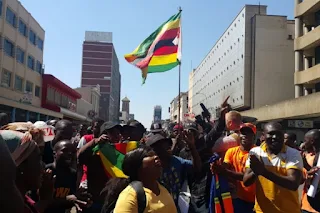Zimbabwe is holding partial legislative elections on Saturday in which almost all opposition candidates have been banned from participating, with President Emmerson Mnangagwa seeking to ensure, according to observers, a long unchallenged reign.
The southern African country held general elections in August. The vote, the regularity of which was questioned, offered a second term to the 81-year-old president, and 177 seats out of 280 in Parliament to his party, Zanu-PF.
The ruling party has only missed 10 seats since independence in 1980 to win a two-thirds majority and be free to revise the country's laws.
But two months after the election and following an outrageous ploy, 14 opposition deputies were dismissed, paving the way for by-elections in 9 constituencies on Saturday. And two days before the election, a court in Harare ordered that 8 of the 9 candidates from the first opposition party, the Citizens' Coalition for Change (CCC), be barred from running.
This situation "undermines any hope of democracy in Zimbabwe", professor of African politics at the University of Birmingham, Nic Cheeseman, told AFP.
The crisis was triggered by a letter, riddled with spelling errors, addressed in October to the Speaker of Parliament by a man named Sengezo Tshabangu, presenting himself as the "acting secretary general" of the CCC, but described as an "impostor " by the opposition party.
He declared that 15 deputies, having left the party, could not keep their seats.
The leader of the CCC, Nelson Chamisa, had asked Parliament to ignore this letter: the CCC does not have a general secretary and the party has neither expelled nor recalled any deputies, he explained.
But the Speaker of Parliament, a member of Zanu-PF, declared the seats vacant with the electoral commission.
Zanu-PF denied being any conspiracy: "We have an irresponsible, selfish opposition in a state of implosion," party spokesperson Farai Marapira told AFP.
- “People are tired” -
In Mabvuku, a suburb of Harare called to the polls on Saturday, a few rare electoral posters are visible in the streets. This is the only constituency where the CCC still has a candidate in the running.
But "I won't be surprised if Zanu-PF wins. There is apathy, people are tired," admits Gladmore, 28, from the neighborhood.
Zimbabwe has been overwhelmed by a deep economic crisis for around twenty years. The country is weighed down by power cuts, shortages and endemic unemployment.
According to specialists, these by-elections are the first stage of a maneuver by the government to win a two-thirds majority in Parliament. With the aim of amending the Constitution which would allow Mnangagwa to extend his reign by lowering the limit of two presidential mandates.
Nicknamed “the crocodile” for his reputation as an authoritarian president, Mnangagwa succeeded Robert Mugabe, ousted in 2017, in a coup.
His coming to power had raised hopes of a democratic renewal and a recovery of the economy, recalled Christopher Vandome, researcher at the Chatham House think tank.
But Parliament recently adopted “liberticidal” laws, according to rights defenders. And the opposition regularly denounces violent repression carried out by those in power with arrests and kidnappings of opponents.
The CCC is fighting in court, so far in vain, to counter the attacks against its parliamentarians. Last month, the party lost 18 new seats. The same scenario as before was used by the so-called general secretary of the CCC.
“Their internal struggles are our harvest,” quipped Patrick Chinamasa, treasurer of Zanu-PF, on Thursday during a party rally near Harare followed by thousands of supporters.


Good
ReplyDelete